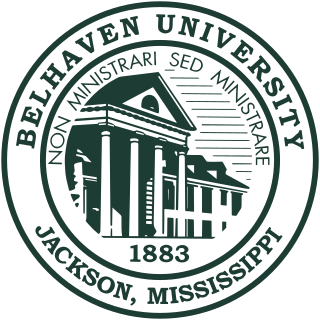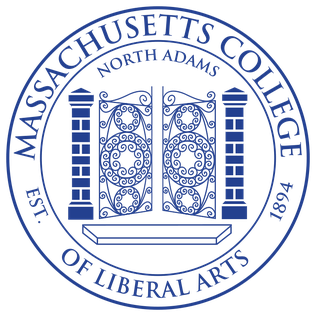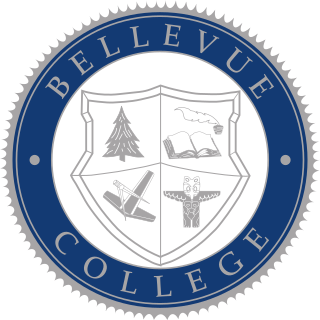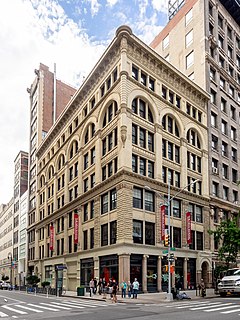
A community college is a type of educational institution. The term can have different meanings in different countries: many community colleges have an "open enrollment" for students who have graduated from high school. The term usually refers to a higher educational institution that provides workforce education and college transfer academic programs. Some institutions maintain athletic teams and dormitories similar to their university counterparts.

Belhaven University is a private evangelical Christian university in Jackson, Mississippi. Founded in 1883, the university offers traditional majors, programs of general studies, and pre-professional programs in Christian Ministry, Medicine, Dentistry, Law, and Nursing.

Berklee College of Music is a private music college in Boston, Massachusetts. It is the largest independent college of contemporary music in the world. Known for the study of jazz and modern American music, it also offers college-level courses in a wide range of contemporary and historic styles, including rock, hip hop, reggae, salsa, heavy metal and bluegrass. Berklee alumni have won 310 Grammy Awards, more than any other college, and 108 Latin Grammy Awards. Other notable accolades for its alumni include 34 Emmy Awards, 7 Tony Awards, 8 Academy Awards, and 3 Saturn Awards.

Charter Oak State College is a public online college based in New Britain, Connecticut. The college was founded in 1973 by the Connecticut Legislature and offers associate, bachelor's, and master's degrees. The college is adjacent to Central Connecticut State University and is named for Connecticut's famous Charter Oak.
Rockland Community College (RCC) is a public community college in the town of Ramapo, New York in Rockland County. It is part of the State University of New York. The college, established in 1959, became the 18th community college to join the SUNY system. The college offers 51 programs and offers associate degrees and certificates. Additionally, students can earn other degrees, including Bachelor of Arts, Bachelor of Science, and Master of Arts in the arts and sciences, Doctoral Program in Executive Leadership (EdD), technology, and health professions while attending classes at Rockland through articulation programs with four-year schools. The current enrollment is 6,859 full and part-time students which includes about 125 International students from more than 50 foreign countries and approximately 800 high school enroll in credit courses.

The Massachusetts College of Liberal Arts (MCLA) is a public liberal arts college in North Adams, Massachusetts. It is part of the state university system of Massachusetts. It is a member of the Council of Public Liberal Arts Colleges. Originally established as part of the state's normal school system for training teachers, it now offers a wide variety of programs leading to Bachelor of Science and Bachelor of Arts degrees, as well as a Master of Education track.

York College is a public senior college in Jamaica, Queens, New York City. It is a senior college in the City University of New York (CUNY) system. Founded in 1966, York was the first senior college founded under the newly formed CUNY system, which united several previously independent public colleges into a single public university system in 1961. The college is a member-school of Thurgood Marshall College Fund. The college enrolls more than 8,000 students. 35% of undergraduate students graduate within six years.

Nyack College is a private Christian college affiliated with the Christian and Missionary Alliance and located in New York, New York. Enrolling just over 1,000 students, the school is organized in three academic divisions, including the Alliance Theological Seminary, the College of Arts and Sciences, and the College of Graduate and Professional Programs. Nyack offers both on-campus and online courses as part of its undergraduate, graduate, and seminary programs.

Asia-Pacific International University is a private Christian university located in Saraburi, Thailand. Its main campus is in the rural town of Muak Lek, Saraburi Province and the nursing school is located on the grounds of Bangkok Adventist Hospital in downtown Bangkok. It is the only tertiary education institution serving the Southeast Asia Union Mission of Seventh-day Adventists. Asia-Pacific International University was formerly called Mission College until mid-2009 when it was granted university status. It is a part of the Seventh-day Adventist education system, the world's second largest Christian school system.

Bellevue College (BC) is a public college in Bellevue, Washington. It is the largest of the 34 institutions that make up the Washington Community and Technical Colleges system and the third-largest institution of higher education overall in the state.

Tiffin University is a private university in Tiffin, Ohio. It was founded in 1888 and is accredited by the Higher Learning Commission. The university offers undergraduate and graduate degree programs at the main campus in Tiffin, Ohio; the University of Bucharest in Romania; and several locations in Ohio, including the Cleveland, Toledo, and Fremont areas, as well as online.

St. Andrews University is a private Presbyterian liberal arts college in Laurinburg, North Carolina. The university was established in 1958 as a result of a merger of Flora MacDonald College in Red Springs and Presbyterian Junior College; it was named St. Andrews Presbyterian College from 1960 until 2011 when the college changed its name to St. Andrews University. That same year, it merged with Webber International University of Babson Park, Florida. It is also home to the St. Andrews Press. In 2013, St. Andrews added its first graduate program, an MBA in business administration.

Milano School of Policy, Management, and Environment is a graduate school at The New School within The Schools of Public Engagement that offers degrees in environmental policy and sustainability studies, nonprofit management, organizational change management, public policy and urban policy, as well as a PhD. program in public and urban policy and three graduate certificates.

The Association of Independent Colleges of Art and Design (AICAD) is a non-profit consortium of 36 art and design schools in the United States and Canada. All AICAD member institutions have a curriculum with full liberal arts and sciences requirements complementing studio work, and all are accredited to grant Bachelor of Fine Arts and/or Master of Fine Arts degrees. To qualify for AICAD membership an art school must be: a free-standing college specializing in art or design; a non-profit institution; grant BFA and/or MFA degrees; and have accreditation from both the National Association of Schools of Art and Design (NASAD) and the relevant academic accrediting organization in their region.

Pitt Community College (PCC) is a public community college in Winterville, North Carolina in Pitt County. The college is part of the North Carolina Community College System, a state-supported body of 58 institutions throughout North Carolina. It has an enrollment of over 9,000 undergraduate students with a total of 11,771 students enrolled in the Curriculum Program. Pitt Community College is accredited by the Southern Association of Colleges and Schools to award Associate's Degrees.
The basic requirement for pharmacists to be considered for registration is an undergraduate or postgraduate pharmacy degree from a recognized university. In many countries, this involves a four- or five-year course to attain a master of pharmacy degree (MPharm). In the United States of America, students graduating after January 1, 2003, must complete a doctor of pharmacy degree to become a licensed pharmacist. This same requirement has been coming into place in other countries such as Canada and France.

The University of Pittsburgh School of Social Work, one of the 13 schools and colleges within the University of Pittsburgh, is located in the Oakland section of Pittsburgh, Pennsylvania. Its offices are in the world-famous Cathedral of Learning, a forty-story, Gothic style edifice that is the signature building of the university.

Cairn University is a private Christian university in Langhorne Manor and Middletown Township, in Bucks County, Pennsylvania. Founded in 1913, the university has six schools: Divinity, Liberal Arts and Sciences, Business, Education, and Music. As of Fall 2021 the university will be closing their Social Work program to new students, with existing students within the program allowed to complete their existing program. All students take a minimum of 30 semester hours of Bible classes.

Franklin University Switzerland is a private, nonprofit and accredited, liberal arts university in Lugano, Switzerland. Founded in 1969, Franklin is one of the oldest American institutions of higher education in Europe and the first to be established in Switzerland. Franklin offers Bachelor of Arts and Master of Science degrees accredited in both the United States and Switzerland.

National University (NU) is a private university with its headquarters in San Diego, California. Founded in 1971, National University offers academic degree programs at campuses throughout California, a satellite campus in Nevada, and various programs online. Programs at National University are designed for adult learners. On-campus classes are typically blended learning courses, concentrated to four weeks or on weeknights with occasional Saturday classes. The university uses asynchronous learning and real-time virtual classrooms for its online programs.


















